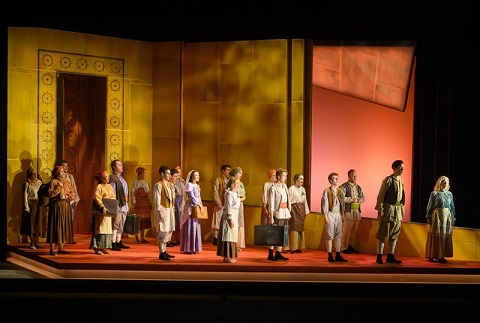Returning from the Trojan Wars, his ships and crew threatened by a tempest,
the Cretan King Idomeneo bargains with the sea-god Neptune in order to save
his own skin, and in so doing risks losing his son, by his own hand. Having
vowed to sacrifice the first person he meets upon his safe arrival on his
home shore, Idomeneo is greeted by his son, Idamante, and finds himself
conflicted by the demands of love and duty. Mozart’s opera seria
dramatizes the King’s attempt to unravel the mess of his own making, as
rivalries, jealousies and intrigues fester and flourish at his Cretan
court. As so often with the Greeks’ tragic tussles, the modern-day
parallels are painfully apparent.
However, in contrast to Austrian director Martin Kušej’s approach at
Covent Garden in 2014
, director James Conway has eschewed the idea of turning the opera into, in
his words, a ‘specific history lesson’, and the untrammelled simplicity of
his conception and its execution in this ETO production of Idomeneo begets rich results. This is a production characterised
by musical insight, dramatic composure and technical excellence, on the
part of the creative team and cast equally. In a programme article, Conway
confesses that he has previously hesitated to direct Idomeneo,
fearing its ‘relentless earnestness’, but here he makes such sincerity a
virtue: this Idomeneo is notable for its clarity, candour and
communicativeness.
Katie Mitchell’s modern-day for production for
English National Opera (2010) had assorted pen-pushers, waiters and flunkies dashing about the stage in
what I described at the time as an ‘unexplained and unfathomable flurry of
activity’. Conway’s approach could scarcely be more different. Here, music
and mise en scène work their magic, aided by Frankie Bradshaw’s
clear-cut designs and Rory Beaton’s bold lighting - how apt for an opera
whose hero is the epitome of Enlightenment values.
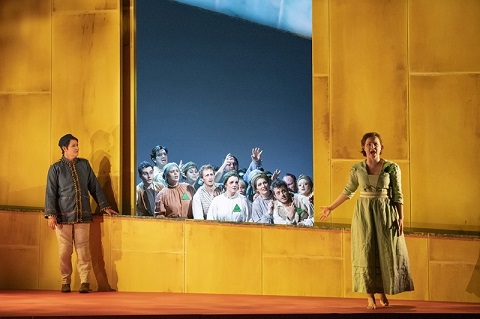 Catherine Carby (Idamante), ETO Chorus, Galina Averina (Ilia). Photo credit: Richard Hubert Smith.
Catherine Carby (Idamante), ETO Chorus, Galina Averina (Ilia). Photo credit: Richard Hubert Smith.
Beaton’s lighting schemes pit strong primary and complementary hues against
each other. Colours transmute - aquamarine and orange, purple and red -
sometimes with a swiftness matching the briskness with which many of
Mozart’s arias follow the recitative, elsewhere more organically. The
palette and brightness, by turns intensified and muted, evoke locale - the
infinite ocean, a waterfront, the stormy sky - and mirror inner passions.
The stage is quite foreshortened by an imposing edifice which stretches its
length, but a mosaic-bordered exit stage-right suggests a depth beyond -
what Conway describes as ‘a doorway leading to something suggesting
culture’ - and sliding panels concertina to open up vistas, revealing the
Cretan populace, who suffer as a result of their ruler’s failings, and the
captured Trojans who are confined in a prison evoked by a slanting panel
which tilts menacingly. The ETO Chorus, though distanced for much of the
production - placed ‘beyond’ the struggles within the court, but no less
affected by them - were in strong voice.
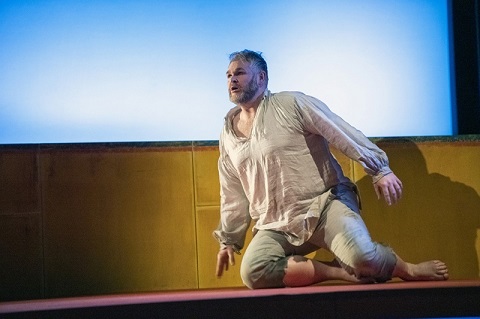 Christopher Turner (Idomeneo). Photo credit: Richard Hubert Smith.
Christopher Turner (Idomeneo). Photo credit: Richard Hubert Smith.
The cast, too, offered consistently fine Mozartian singing. As Idamante,
mezzo-soprano Catherine Carby made us feel each and every of the young
Prince’s emotional twists and turns. This Idamante wore his heart on his
tunic-ed sleeve and Carby acted and sang with candour, the richness of her
voice particularly expressive in the recitatives. On the last few occasions
that I’ve heard Christopher Turner perform (at SJSS in
La Nuova Musica’s Alcina
early this year, and as Pollione in Chelsea Opera Group’s
Norma in 2018) I’ve been more and more impressed by the combination of focus,
power and beauty that his tenor commands. He displayed plenty of ringing
heroism as Idomeneo, compelling our attention: the bravura of his Act 2
aria, ‘Fuor del mar’, conveyed both the King’s regal stature and his
self-inflicted anguish and fear. Turner has a strong lower range which
brought out the darkness within this morally questionable monarch; but
there was lyrical shapeliness too in Act 3’s beautifully shaped ‘Accogli, o
re del mar’.
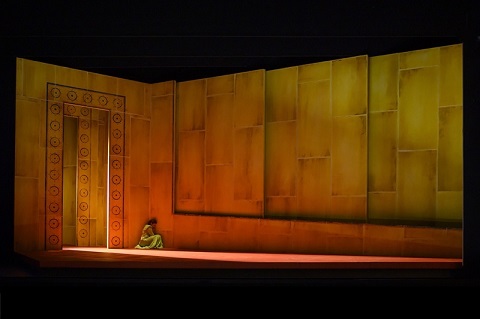 Galina Averina (Ilia). Photo credit: Richard Hubert Smith.
Galina Averina (Ilia). Photo credit: Richard Hubert Smith.
As Ilia - the daughter of the defeated King Priam of Troy who, rescued at
sea by Idamante, has fallen in love with the son of her enemy - Galina
Averina had the difficult task of establishing the mood at the start of
both halves of the performance, but she did so with consummate poise. Alone
on stage, she opened Act 1 as a figure of loneliness and loss, curled
against the wall as if trying to protect herself or escape from the
conflicts within the palace and within her own heart. Averina has a lovely
soft gleam to her sound, which was complemented by the woodwind quartet in
Act 2’s ‘Se il padre perdei’; and, while ‘Zeffiretti lusinghieri’ was
similarly moving, Averina was able to bring urgency to her tone when
required.
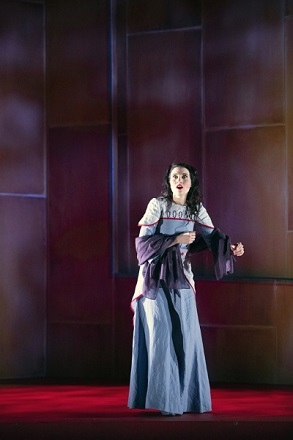 Paula Sides (Elettra). Photo credit: Richard Hubert Smith.
Paula Sides (Elettra). Photo credit: Richard Hubert Smith.
Paula Sides seemed a little hesitant initially as Elettra - the daughter of
Agamemnon and Clytemnestra who has taken refuge among the Cretans after her
brother Orestes has committed matricide, and who is Ilia’s rival for
Idamante’s love - but her Act 2 aria ‘Idol mio’ was rich with emotions
which exploded further in her final aria, ‘D’Oreste, d’Ajace ho in seno i
tormenti’. In the latter, the torments of Elettra’s own unrequited passion
and of her brother’s crime fused in a glittering fiery outburst. Sides
captured Elettra’s vengeful vindictiveness and her pathos; as she yearned
to follow Orestes to the abyss, the shapes carved by her soprano were as
sharply defined as the edge of the knife she wielded.
The roles of Arbace, the King’s counsellor, and the High Priest were
amalgamated and sung with vigour and urgency by John-Colyn Geantey, though
perhaps a bit less dashing about would have brought more gravity to the
High Priest’s persona. As the Voice of Neptune, Ed Hawkins was fittingly
resonant and imposing. The ETO Orchestra played with brio for conductor
Jonathan Peter Kenny who created fluency between the recitatives and arias,
which are often conjoined in the score.
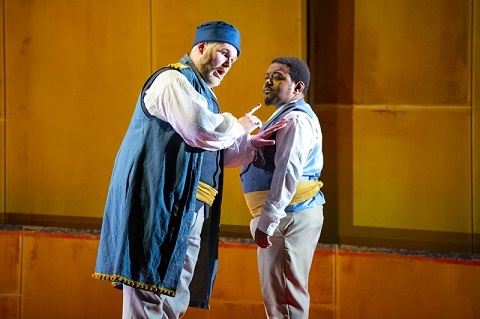 Christopher Turner (Idomeneo) and John-Colyn Geantey (Arbace). Photo credit: Richard Hubert Smith.
Christopher Turner (Idomeneo) and John-Colyn Geantey (Arbace). Photo credit: Richard Hubert Smith.
Heading towards disaster, Idomeneo can only hope for divine intervention
and mercy. He and subjects are fortunate: it proves easier for the Cretan
King to do a deal with the deities than it evidently is for some modern-day
leaders to negotiate with their counterparts abroad and their ‘allies’ at
home. And so, Idomeneo’s reckless promise is revoked and order restored.
Idamante slays the sea monster and buries past conflicts, and while
Idomeneo has to relinquish power to the next generation, the continuity of
the family line is ensured, as a new world begins. If only we could be so
lucky.
The regicidal Macbeth, too, might wish for similar good fortune, for in
Shakespeare’s Scottish play supernatural interventions bring not
reconciliation and renewal but deceit and destruction. Not that the witches
in James Dacre’s production are particularly menacing, although the female
Chorus sang with vigour and precision. At the start, cloaked in green
habits and white aprons, this gaggle of nuns-cum-nurses tend to the wounded
and lay out the dead, all the while singing of the vicious torments which
they have inflicted upon the unfortunates who have crossed them. These are
not Shakespeare’s ‘withered and so wild’ hags with ‘choppy fingers’,
‘skinny lips’ and ‘beards’ who emerge from mist and dissolve into darkness;
nor the ‘compound’ figures in Verdi’s opera who - as shaped by the
composer’s interest in the writings of Shakespeare’s German translator
August Schlegel - are both emblems of the superstitious lower classes and
Delphic agents of fate. Instead, this ministering brood, medicinal rather
than murderous, might have looked more at home in a G&S operetta - or,
when Verdi’s rum-te-tum choruses are given a cheery boost by conductor
Gerry Cornelius, on the set of The Sound of Music. Thus, when
Macbeth and Banquo, fresh from their trouncing of the merciless Macdonald
and with the traitorous Thane of Cawdor’s limp body swinging from a noose
at the rear of Frankie Bradshaw’s twilight-zone set - meet the witches for
the first time, their query, ‘What are these foul beasts?’, falls rather
flat.
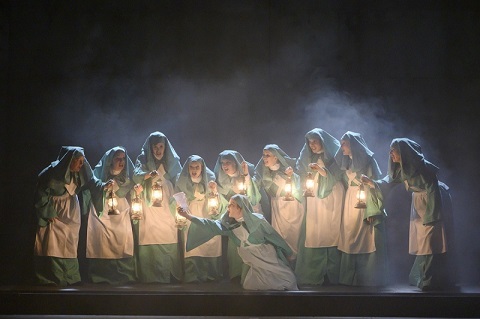 Photo credit: Richard Hubert Smith.
Photo credit: Richard Hubert Smith.
The representation of the witches seems to me to be central to the impact
that the opera makes, especially because of the identification with the
witches that Lady Macbeth’s music intimates. Christoph Clausen (in
Macbeth Multiplied: Negotiating Historical and Medial Difference
Between Shakespeare and Verdi) has argued that although a comic treatment of witches was the norm in
late-eighteenth and early-nineteenth century theatre, by the mid-nineteenth
century witches were depicted on stage as more sinister figures. But, even
if Clausen is correct, we have Verdi’s directives to his librettist
Francesco Maria Piave, in letters written during September 1846, that he
should ‘adopt a sublime diction, except in the witches’ choruses, which
must be vulgar, yet bizarre and original [triviali, ma stravaganti ed originali]’. What did Verdi mean by
‘trivial’? Verdi scholar Julian Budden has claimed that the first witches’
chorus merely captures the ‘childish malice’ of the witches in
Shakespeare’s play, while the second ‘has all the deliberate vulgarity of
its predecessor without any of the fantasy. It is just any chorus of
gipsies or peasants.’ Whatever, representing the witches as sisters of
Christ doesn’t seem to me to make much sense: the witches inflict pain
rather than assuage it.
The opera is presented in English and this, too, seemed to me to be
misguided. Of course, exigencies of dramatic form and pace necessitated
excisions which alter relationships and motivations in the opera: thus,
Verdi’s Lady Macbeth becomes unequivocally a dominating demon rather than
just an instigator, encourager and accomplice, and she is the mastermind of
the plot to murder Banquo, rather than a caring wife pushed aside by her
increasingly isolated and sick husband. Also, Verdi was himself more
influenced by the various Italian translations of Shakespeare than directly
by the Bard’s text itself, although, in the face of criticisms of his
libretto, Verdi wrote to Léon Escudier, his French publisher (April 1865),
complaining that although he was accused of not ‘knowing his Shakespeare’,
‘in this they are very wrong. It may be said that I have not rendered Macbeth well, but that I don’t know, don’t understand, and don’t
feel Shakespeare-no, by God, no. He is a favourite poet of mine, whom I
have had in my hands from earliest youth, and whom I read and reread
constantly.’
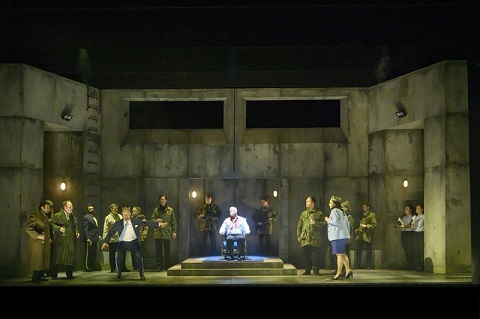 Photo credit: Richard Hubert Smith.
Photo credit: Richard Hubert Smith.
The point here, though, is that Andrew Porter’s translation is a prosaic
paraphrase of Shakespeare’s poetry which reduces the emotive impact of the
words. For example, Macbeth sees ‘gouts of blood’ upon the blade and
dudgeon of the hallucinated dagger: why change this to ‘drops of
blood’? End-of-scene summaries are also offered; but surely there can be
few in the audience who are unfamiliar with the basic plot. An Italian text
would have retained the lyricism and rendered an emotional heightening
of the tragedy.
What Dacre’s production does do successfully is to bring the political
rather than the personal to the fore: after all, premiered in Florence in
1847, at the height of unrest about Italian reunification, Macbeth surely articulates Verdi’s devotion to Italian
independence and his abhorrence of the tyrannical abuse of power.
Bradshaw’s set is a concrete bunker, which harbours secret niches and
nooks, permitting intrigue and, in the Grand scena and duet in Act 1,
intimacy. Infernal intrusion, too, when the ghost of Banquo - bloodstained
but not quite shaking ‘gory locks’ at the hysterical Macbeth - imposes
himself behind the throne positioned and raised in the central recess. CCTV
cameras capture the corruption, and attest to Macbeth’s paranoia; until,
that is, a black-clad assassin disables them prior to Banquo’s murder.
Dacre updates the drama to the modern age: Macbeth and Banquo swap their
officers’ regalia for sharp suits, while Lady Macbeth sports attire
suggesting executive power. As rag-bag mercenaries in combat fatigues,
beanies and balaclavas dash about the stage, the effect is pacy and punchy
- though I winced when Ruger MK I’s were waved menacing at the mention of
swords and daggers.
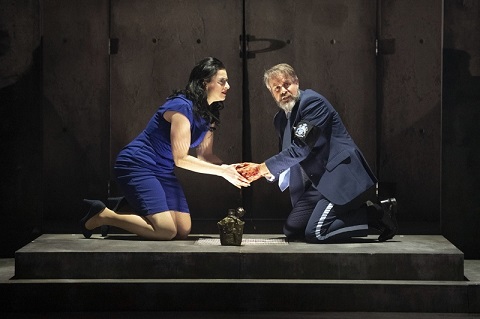 Madeleine Pierard (Lady Macbeth) and Grant Doyle (Macbeth). Photo credit: Richard Hubert Smith.
Madeleine Pierard (Lady Macbeth) and Grant Doyle (Macbeth). Photo credit: Richard Hubert Smith.
The singing, too, provides much enjoyment. As Lady Macbeth, Madeleine
Pierard may not comply with Verdi’s request for ugly, declamatory sounds
and hollow whispers, but she does make a good effort to use vocal colour to
portray complexity of character and the dangerous energies of Lady
Macbeth’s inner life. There’s a false note in the sleep-walking scene,
though, when Lady Macbeth puts out her own light, for the taper that she
carries - ‘she has light by her continually; ‘tis her command’, so her Gentlewoman
tells us - is her only defence against the darkness which she has summoned
and delighted in and which now consumes and terrorises her.
Macduff is reduced to a minor role by Piave and Verdi, but Amar Muchhala
makes his aria count, singing expressively and with dramatic impact. Andrew
Slater is vocally woolly-edged as Banquo but he establishes a nice rapport
with Dara Gibo’s Fleance, the latter’s suitably guileless and vulnerable
demeanour evoking a pathos which is rare in this production.
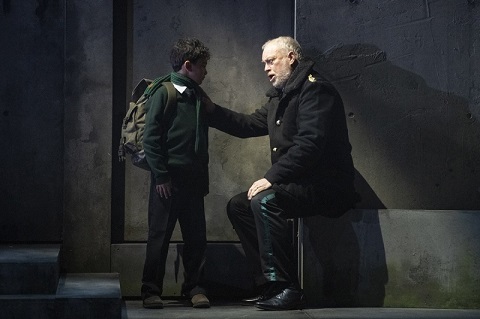 Andrew Slater (Banquo) and Dara Gibo (Fleance). Photo credit: Richard Hubert Smith.
Andrew Slater (Banquo) and Dara Gibo (Fleance). Photo credit: Richard Hubert Smith.
ETO regular Grant Doyle rages and rampages as Macbeth but achieves volume
at the expense of subtlety of characterisation and nuance of vocal line.
This is a broad-stroke interpretation, and while Doyle has an appealing
baritone it feels pushed to the limit at times here; there is little sense
of the interior life - the conscience and guilt which make Macbeth a ‘man’
rather than just a murderous tyrant. Even his final aria, ‘Mal per me che
m’affidai’, though sung with intensity and focus, did not quite capture the
sense that this is a turning-point, a moment when Macbeth truly regrets his
actions recognising that they have brought him a ‘power’ which is transient
and false, and that he has denied himself the honour, love, obedience and
friendship which should accompany old age.
Cornelius keeps the action surging forward and, attentive of the details of
orchestration, conjures the dark tinta of the score.
English Touring Opera’s
2019 Spring Tour
continues until June 1st.
Claire Seymour
Mozart: Idomeneo
Ilia - Galina Averina, Idamante - Catherine Carby, Idomeneo - Christopher
Turner, Arbace - John-Colyn Gyeantey, Elettra - Paula Sides, The Voice of
Neptune - Ed Hawkins; Director - James Conway, Conductor - Jonathan Peter
Kenny, Designer - Frankie Bradshaw, Lighting Designer - Rory Beaton, ETO
Chorus and Orchestra.
Hackney Empire, London; Friday 8th March 2019.
Verdi: Macbeth
Macbeth - Grant Doyle, Lady Macbeth - Madeleine Pierard, Banquo - Andrew
Slater, Macduff - Amar Muchhala, Malcolm - David Lynn, Lady-in-Waiting -
Tanya Hurst, Doctor - Ed Hawkins; Director - James Dacre, Conductor -
Gerry Cornelius, Designer - Frankie Bradshaw, Lighting Designer - Rory
Beaton, ETO Chorus and Orchestra.
Hackney Empire, London; Saturday 9th March 2019.
